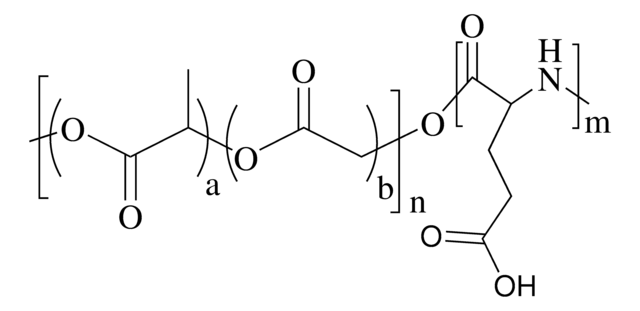추천 제품
설명
Electrochemical activity: see attached CV result
Quality Level
형태
solid
환경친화적 대안 제품 특성
Design for Energy Efficiency
Learn more about the Principles of Green Chemistry.
sustainability
Greener Alternative Product
색상
black
solubility
soluble (swell into hydrogel but does not dissolve in water)
환경친화적 대안 카테고리
일반 설명
We are committed to bringing you Greener Alternative Products, which adhere to one or more of the 12 Principles of Green Chemistry. This product is used in energy conversion and storage, thus has been enhanced for energy efficiency. Click here for more information.
애플리케이션
Three-dimensionally cross-linked polypyrrole (3D cross-linked polypyrrole) is a conductive powder made by crosslinking polypyrrole with a dopant molecule - phytic acid. It can form intrinsically conductive hydrogels with a hierarchically porous microstructure. Its porosity promotes transport of electrons and facilitates the diffusion of ions and other small molecules. Its flexibility can also help accommodate the strain caused by volume change during electrochemical cycling. Together with the advantage of high surface area, and biocompatibility, this material provides the feasibility for fabricating flexible, lightweight, energy and bioelectronic devices. Three-dimensionally cross-linked polypyrrole can also been derived into porous carbon nanomaterials via post thermal treatment and activation. The resulted carbon matrix has maintained the hierarchical nanostructure of 3D cross-linked polypyrrole and has been demonstrated as an effective additive to improve energy storage and conversion performance of other electrochemically active materials.
Storage Class Code
11 - Combustible Solids
WGK
WGK 3
Flash Point (°F)
Not applicable
Flash Point (°C)
Not applicable
가장 최신 버전 중 하나를 선택하세요:
Designing Hierarchically Nanostructured Conductive Polymer Gels for Electrochemical Energy Storage and Conversion.
Shi Y,et al.
Chemistry of Materials, 28(8), 2466-2477 (2016)
Nanostructured conductive polypyrrole hydrogels as high-performance, flexible supercapacitor electrodes.
Shi Y,et al.
Journal of Material Chemistry A, 2, 6086?6091-6086?6091 (2014)
Graeme S A, et al.
Journal of Power Sources, 196, 1-12 (2011)
Borui Liu et al.
Nano letters, 13(7), 3414-3419 (2013-06-22)
Silicon is considered one of the most promising anode materials for high-performance Li-ion batteries due to its 4200 mAh/g theoretical specific capacity, relative abundance, low cost, and environmental benignity. However, silicon experiences a dramatic volume change (∼300%) during full charge/discharge
문서
Recent demand for electric and hybrid vehicles, coupled with a reduction in prices, has caused lithium-ion batteries (LIBs) to become an increasingly popular form of rechargeable battery technology.
Self-healing soft electronic materials offer potential cost savings and reduced electronic waste.
자사의 과학자팀은 생명 과학, 재료 과학, 화학 합성, 크로마토그래피, 분석 및 기타 많은 영역을 포함한 모든 과학 분야에 경험이 있습니다..
고객지원팀으로 연락바랍니다.





